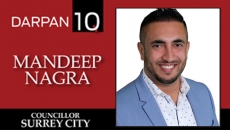1. Could you describe your role and the work that you do?
I am Director of the Children's Health Policy Centre and Professor Emeritus in the Faculty of Health Sciences at Simon Fraser University. I do research, and I am also a practicing child and youth psychiatrist.
2. Heightened anxiety, disruptive behaviours, poor social skills, and learning difficulties have been witnessed in elementary school kids post-pandemic. What can be done to navigate children through this tough time?
You are right about childhood mental health problems increasing during COVID-19 — particularly anxiety and depression. There are many high-quality studies now showing how serious this issue is. But there are also many things we can do to help children. For instance, cognitive-behavioural therapy (CBT) approaches can both prevent and treat anxiety — the most common childhood mental health problem before, during and after the pandemic. We also know how to prevent and treat most other childhood mental health conditions. So lots can be done to help children.
3. Have you encountered instances where young students are struggling to adjust to the classroom environment or exhibit delays in social and emotional development compared to their peers from previous years?
The best available recent studies suggest that many children will struggle more and need more services compared to their peers in previous years.
4. Dr. Bonnie Henry thinks that kids are adjusting, and the support they offer in classrooms is helping – what is your understanding of the situation, and what more can the BC government do to help the youngest members of our society?
Even before the pandemic, we knew that only 44% of children with mental disorders were getting help. This is very serious given that, as a society, we would not tolerate these kinds of essential healthcare shortfalls if children had cancer or diabetes. So we need to do better, particularly knowing that problems increased during the pandemic. Therefore, the public needs to support the BC Government to double the investments going to children's mental health. We need to ensure that 100% of kids with mental health problems receive help, not just 44%.
5. When it comes to a solution-oriented approach, would the BC government investing more money into children be a starting point for dealing with this problem?
The money is very important. But in addition, the BC Government needs to support a more coordinated (as well as expanded) approach. For example, the provincial Child and Youth Mental Health Service through the BC Ministry of Children and Family Development could be supported to take the lead on expanding early prevention and treatment programs. We need to reach kids from birth to age 18 years and beyond — the whole age range. As well, the BC Ministry of Health and the Health Authorities need to be part of this coordinated effort, for example, supporting prevention efforts through public health. Kids need both the money and a thoughtful whole-of-government plan.
6. It's not just children but also teachers who have experienced burnout due to this. What are some techniques and tools that can be provided to teachers so they can take care of their own mental and physical health?
Mental and physical well-being is crucial for teachers, parents, and all adults involved with children. So we need to support those caring for children in better ways. In particular, we need to address groups disproportionately affected by the pandemic, such as those living and working in communities experiencing socioeconomic disadvantage and colonialism and racism. Your question is a good starting point in valuing and recognizing the efforts of those who care for children.
7. Many parents are experiencing children having difficulty focusing, impulse control, and emotional regulation. What resources can be provided to parents so they don't feel isolated during this time?
For parents and families, many of the effective approaches we have identified in the research are directly applicable. For example, CBT and many other interventions work better when parents are involved. For behaviour, parent support and training are a mainstay of helping kids. Our website gives more information: childhealthpolicy.ca.
8. A doctor at Vancouver Coastal Health pointed out that this trend of children acting out is not new; however, this time around, it is worse due to the pandemic. She points out that child poverty, social media, and environmental factors play a big role. How can we wean children off their dependency on technology and have them engage better in the school and the larger community?
There are many potential causes of the increases we are seeing in children's mental health problems. But definitely, avoidable adversities play a large role — making it harder for parents and families to cope because they are dealing with so much. So if parents and families are better supported, they can help kids manage technology. But it goes beyond parents and families. Children are a collective responsibility. All children involve all of us. A starting point is the article you are writing — raising awareness about children's needs. And we can all play a part.
9. As part of your education and work that you have done with children, can you share some insights that would help better the public education system as a whole?
A huge lesson for me, in thinking of the research and the young people I have cared for as a child and youth psychiatrist, is to address social disparities in our society. Again, I am considering adversities such as socioeconomic disadvantage, colonialism, and racism. These problems do not cause all childhood mental disorders. But they affect kids unequally. So some kids have to carry higher burdens than others, through no fault of their own. In turn, the stresses associated with kids having to take these extra burdens can translate into higher rates of certain mental disorders over time. So it would help to address these disparities, treat all kids well, and ensure adequate prevention and treatment services for mental health difficulties. In turn, it will help the public education system if more kids are flourishing.
10. What message would you like to share with the South Asian community?
Keep the focus on kids





